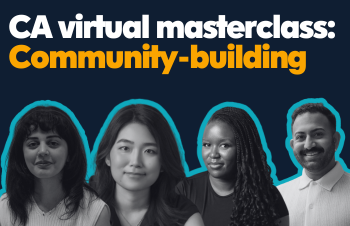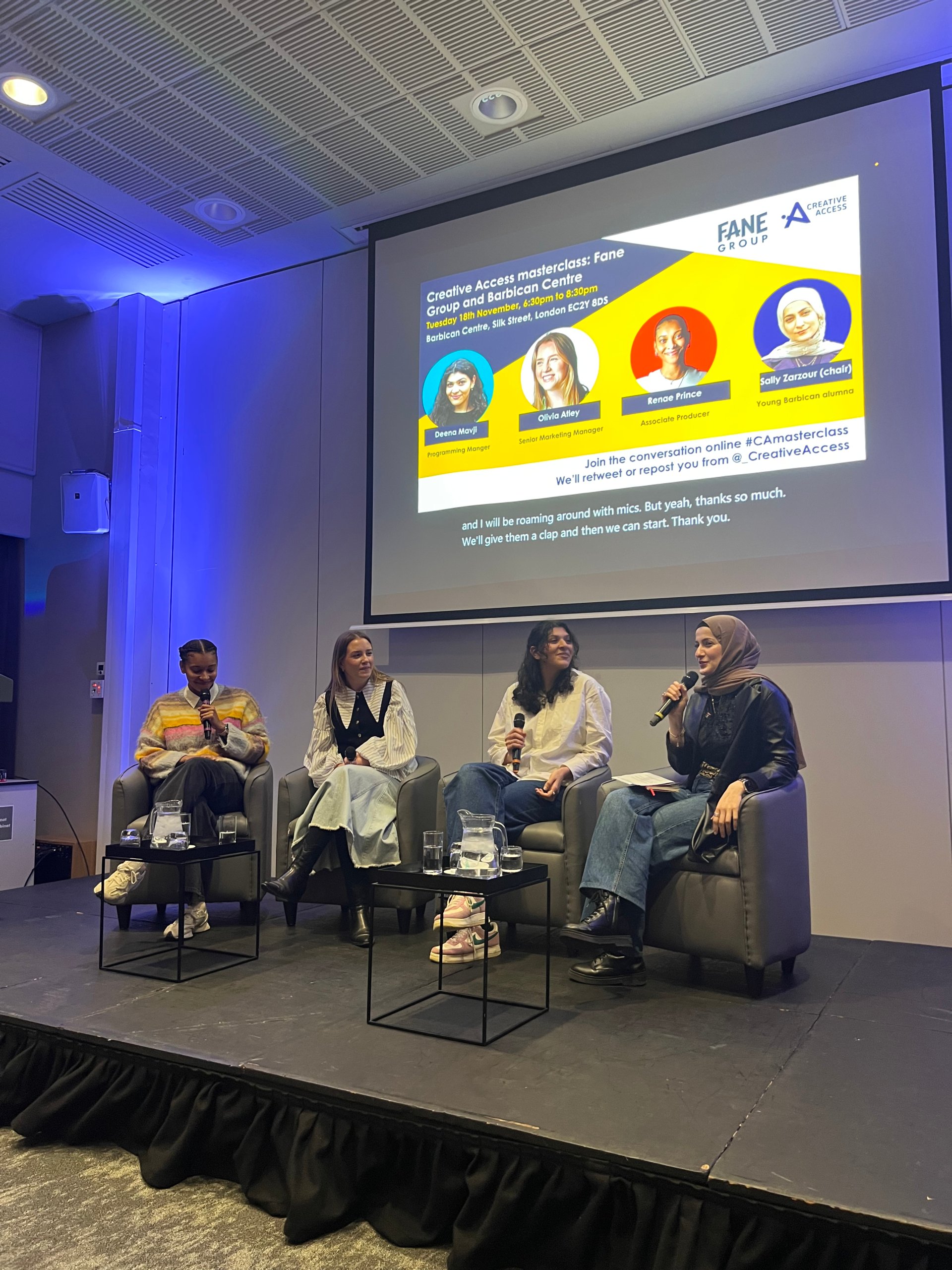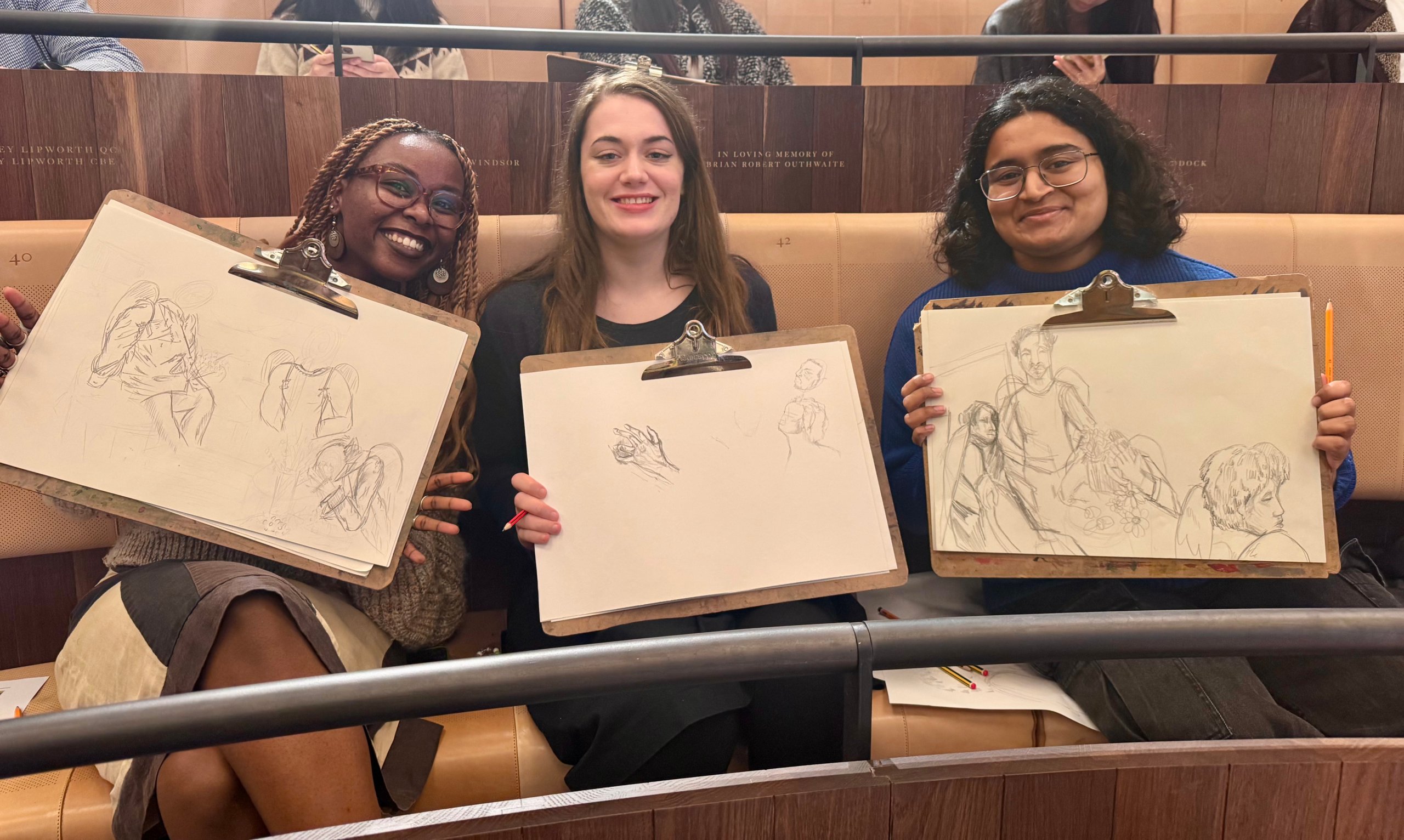We were delighted to join ITV Academy at ITV’s White City space to hear from a panel working across the world of TV production, from editorial to production management, working in both scripted and unscripted, as well as two seasoned Creative Access ITV alumni sharing their insights.
Our panel:
- Amrit Kaur Bassi, social purpose manager at ITV (chair) – Creative Access alumni
- Modupe Aluko, post-production manager at Potato
- Verina Burt, head of news features at Good Morning Britain
- Kishan Koria, editor of Peston at Multistory Media – Creative Access alumni
- Sophia MacKay, production manager, Scripted at ITV Studios

Here’s what we learnt…
“No two days are the same”
With live TV, things can change whilst on air. This is something Verina knows all too well: with 25 years experience and having worked her way up doing all sorts of production roles, she now runs the team who organise the daily debates, producing the participants, as well as big campaigns and national surveys at Good Morning Britain. Verina said everything is reactive to what’s in the papers that day – you must think on your feet and adapt to what’s happening in the world around you.
This is something Kishan, who started off as an intern on Peston seven years ago via Creative Access and has been there ever since, agrees with. As editor he works out who’s on the programme and how the show runs, as well as being in the ear of the presenter.
He explained that things change a lot, despite Peston being one-hour long ep a week and said that the biggest change he experienced whilst on air changing the format of the show was when the Capitol was stormed in 2022. He told the audience that keeping the format fresh is key: “If you want to make good current affairs TV you need to move with what’s happening, so it feels live.”
Fellow Creative Access alumni Amrit also started off as a trainee at ITV in the social purpose team and is now a manager in the department. She works internally and externally supporting ITV’s missions around mental well-being, diversity, equity and sustainability, and helping the next generation of TV talent. She said: “I find it so difficult to describe my job because it’s so varied”.
Meanwhile, Sophia explained that because her role is an overview, she is involved at every stage: doing everything right from the beginning such analysing the viability of a production (whether it can even be made), to pre-production, script breakdown, helping the team crew up and liaising with all the in-house teams. She then supports the team on the ground during the shoot and supports a smooth transition into postproduction, and even organises press screenings.
The main differences between scripted and unscripted
Sophia, having worked across both areas, says essentially the script means that there’s actors, bigger budgets and longer schedules as well as planned sequences (versus impromptu scenes that happen in unscripted).
Although there are also ‘loose’ scripts in unscripted TV… Modupe, who works mostly on The Chase, told us that the researchers dig into the contestants’ interests and backgrounds and relay this to Bradley Walsh so he can build a rapport. So, in unscripted, the script tends to act as a way to lay down the basics for natural conversations to unfold.
Sophia recommends that if you want to make the crossover from scipted into unscripted you shoudl try and upskill and learn about concepts such as screenwriting and lighting techniques.

Passion is everything!
If you’re interested in TV, you probably know by now that it often requires long days. Modupe explains that as a production manager “you’re the first to be there and you’re the first to leave” and that you’re often the person everyone across the team comes to for help. Modupe said that she tends to record 3 shows a day, starting very early and finishing quite late.
However, Modupe explains that her love of organisation means the long hours are “very rewarding” and she was keen to tell the audience that you do get that time back. She recommends that people wanting to break into TV utilise their transferable skills and passions to help them find what they want to specialise in.
Kishan said: “Nothing is more important than love of the area you want to cover”. He explained that it’s difficult for people to respond well to a programme if the people behind-the-scenes making that programme don’t love the subject matter, continuing that all his team are politics-obsessed.
TV is a fast-paced environment and mistakes can happen. Kishan says your team is there for you to rely on when things go wrong, or you need help: “The key thing is to know you’re part of a team – there’s meant to be a support system in place. The worst thing is to cover it up, the best thing you can do is talk to your team and ask them how you can fix it.”
As always, we asked our panel…
What’s the one bit of advice you would give to someone starting out?
Verina: “It’s such a varied career, don’t be afraid if you don’t know what path to take yet. It’s never too late to change direction.
Use your transferable skills, career paths are changing whether you’ve got a degree or not doesn’t hinder you. If you’re really inspired email people and get the name of the show right! Watch the shows you love that you want to work on. You could even create a YouTube or Tik Tok channel to help build experience.”
Modupe: “There’s only one you. Whatever you like doing – use that! For example, I was the organiser in my family – I didn’t know that skill could mean I’d become a coordinator, find that skill and run with it”
Kish: “Persistence is key. I’ve never received an email from someone who loves politics and wants to learn about TV and not been really flattered by that. It’s ok to follow up and say ‘hey, sorry if you’re busy can I follow up on this’. It does lead to things, even if it doesn’t lead to a job.”
Amrit: “Normalise making mistakes!”
Sophia: “Be proactive – don’t wait until you’re asked to do something. Try and pre-empt what your colleagues need. People will recognise that and think, ‘yes I want them on my next production.’
Be kind and talk to everyone! Confidence comes with experience so just ask questions. You’ll be surprised what you find out”.




